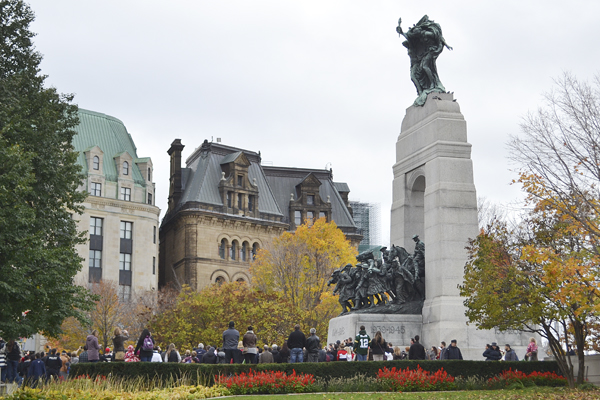Photo: Marta Kierkus
In the wake of the October shootings at Parliament Hill, questions have been raised about how best to protect the sentries who stand guard at the National War Memorial. Recently, it was revealed that the Department of National Defence (DND) is in talks with Ottawa police about providing extra security for these soldiers. Others have suggested the simpler way to guarantee their safety is to arm the guards with real firearms. If these ceremonial guards truly need protecting, how should Canada best guarantee their safety?
The memorial needs extra personnel
The honorary role of ceremonial guards is of great symbolic and cultural importance at historic sites such as Parliament Hill, Rideau Hall, and the National War Memorial.
As such, the brave individuals who volunteer for these positions need to be protected, although public safety shouldn’t be compromised in the process.
In the midst of that tragic day in October, a contentious debate regarding the security measures provided to ceremonial guards arose within the Canadian political sphere, due to the fact that these events highlighted the vulnerability and the potential threat that ceremonial guards are exposed to.
The implementation of extra security measures, courtesy of Ottawa police, is an appropriate response based on the result of a threat assessment conducted by the DND and the Canadian Security Intelligence Service.
Many have criticized these security measures by saying that the idea of guards protecting guards is simply redundant and unnecessary. However, it’s still a better alternative than suggesting that the ceremonial guards must be armed.
This suggestion is not viable because it disregards the very nature of the ceremonial guard. These individuals are supposed to encourage Canadians to visit historic sites like the War Memorial and it’s a little difficult to fulfill this when everyone knows you’re packing heat.
Even Major Michel Lavigne, who was Corporal Nathan Cirillo’s commanding officer before he was gunned down, has opposed this idea, saying, “It is not the role of the Canadian Forces to be armed on the streets of Ottawa.”
It is also important to highlight the fact that allowing a ceremonial guard to carry a live firearm would not guarantee that this individual, no matter how well trained, would have the time to respond to an imminent threat.
As such, hiring extra security for the War Memorial is a nice compromise that should serve to please people on both sides of the political spectrum.
In the end, these proposed security measures are a response to an increased threat and are justified. Whether these are the best measures is up for debate, but arming ceremonial guards with real guns is definitely not the right way to move forward.
—Fanta Ly
Arm the soldiers to defend themselves
It has been five months since Michael Zehaf-Bibeau carried out his attack on Parliament Hill that resulted in the death of Corporal Nathan Cirillo at the National War Memorial.
Although enhanced security measures should be implemented to prevent a repetition of this attack, recruiting the services of off-duty police officers is not a necessary or practical solution.
Attacks like the one in October are not a frequent enough occurrence to warrant such a misallocation of essential resources that could be put to better use. This move by the DND comes off as political posturing, something that’s intended to make people believe that the government is doing everything they can to keep people safe following traumatic events.
Having local police personally assist the RCMP or military immediately may have made sense following the initial attack in October, but it’s not a smart long-term decision.
Instead of settling for these kinds of overly complicated security measures, the government should just cut out the middle man altogether and provide the ceremonial guards with their own personal protection.
Some have already suggested that arming these guards with loaded weapons is a better option than recruiting off-duty officers, which makes sense. If military personnel are going to be standing guard in high-profile public places that are open to everyone—even dangerous people—they should be given a chance to defend themselves in case of an emergency. This would go a long way in mitigating the fallout from potential attacks, and allow police officers to be stationed throughout parts of the city where they are needed most.
Although having armed military personnel stationed within the city might make some people feel uncomfortable, this kind of anxiety can be alleviated by providing military guards with better training to prepare them for future emergencies.
The events that took place on Parliament Hill in October were tragic, and the government should be vigilant yet still practical in its efforts to prevent a similar attack from reoccurring.
—Omar Abdikader





